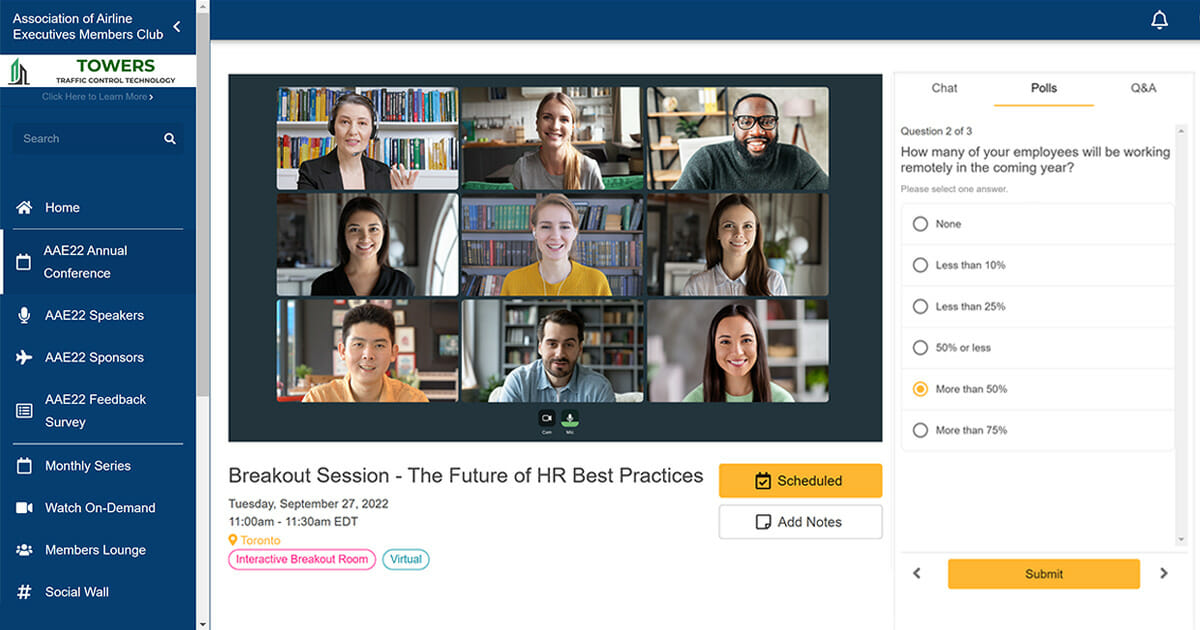Why Building an Event Community is a Hot Trend for 2023
If a global pandemic taught us anything, it’s that the right event management platform can help us stay engaged and connected even when in-person meetings aren’t possible. But as the events industry overwhelmingly reverted back to in-person conferences as soon as restrictions were lifted, event professionals have been left wondering: Is there a way to keep that momentum going year-round?
In short, yes. To meet this demand, event organizers need to balance carefully planned in-person meetings with year-round, online engagement. And an event community could be the answer.
The event community model has been touted as the new promised land, but despite all the buzz, there hasn’t been a lot of practical insight into what that really means. In broad strokes, it’s about understanding the difference between an event community and other online communities. When you dig a little deeper, it’s a matter of realizing just how versatile your event platform can be.
Whether you run association events or corporate meetings, creating an event community within the same platform you are using to build and manage your events means less complexity and effort for you (and for your members!). It also means more opportunities for engagement and revenue generation. Your attendees and sponsors will thank you as they rediscover what it takes to make—and keep—meaningful connections.
Recommended Resource: 📖 Looking for detailed strategies for building an event community that keeps attendees coming back time after time? Download the free guide, The Secret to Successful Attendee Retention: Year-Round Engagement.
The Best Online Communities for Today’s Professionals
Online communities connect like-minded individuals—people who share similar challenges, concerns, and successes.
In the professional world, many companies and associations create branded online communities to keep members engaged in their organizations. Ideally, your online community should provide a platform for peer support and knowledge sharing. But what kind of community presents the best solution?
After weighing your options, we’ll explain why an event community is the best solution in most situations.
4 Types of Online Communities
To help provide some clarity, we’ve broken down professional online communities into four main categories:
- A private employee community
- An exclusive paid user/customer community
- A private association or member community
- A public shared interest community/forum
3 Types of Community Platforms
In turn, there are several different online platforms that can be used for community building:
- Learning management systems (LMS)
- Social networking platforms
- Event platforms
Finding the Right Online Platform for Your Community
The first option, Learning Management Software (LMS), is great for private employee communities and consumer clubs. That’s because these communities are focused on professional development and product training. With that said, these learning platforms generally lack the networking and engagement features of other online options.
The second option, a social networking platform, is one of the most obvious choices for communities based on shared interests. When it comes to professional communities and organizations, however, there are some clear downsides to using public platforms. From the user perspective, public platforms often have the disadvantage of blurring the boundaries between our personal and professional lives, even on LinkedIn.

For that reason, public platforms can create pressure for community members to be ‘always on’. This approach can lead to the erosion of a healthy work-life balance, and the risk of burnout is real.
The third option, an event platform, offers an alternative that strikes a balance between these two competing approaches. By offering year-round access to your event platform, professionals can enjoy a single, digital point of access where they can upgrade their skills through webinars and on-demand training content, and network with other members even after the main event is over. Event organizers or community managers can easily leverage the platform’s content management, communication, and engagement features to streamline how they host content, share important information, foster new connections, and keep their audience engaged in-between events.
Most importantly, using your event platform to host your event community maintains a healthy separation from public forums while still offering avenues to continue the conversation around shared topics of interest.
For all these reasons, event platforms are the ideal choice for association event communities. Because of their ability to combine a high-touch experience with exclusive access, they can also work well for private employee communities, paid consumer clubs, and shared interest groups.
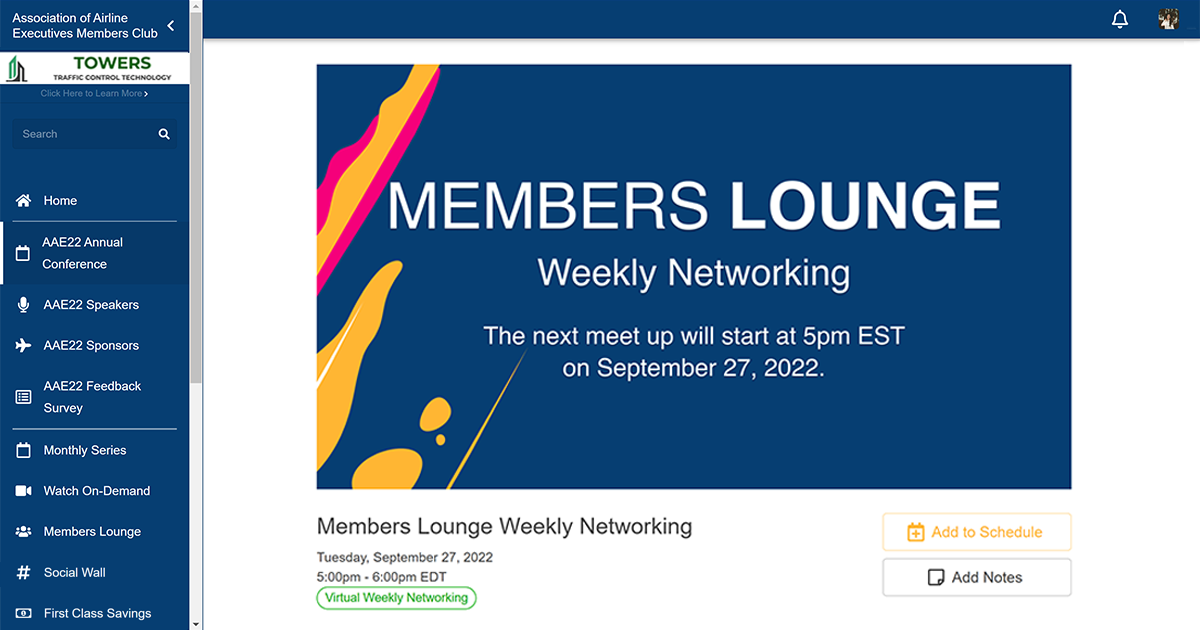
8 Practical Benefits of Using an Event Platform
To help inspire your own event community, we’ve put together 8 key benefits of using your event platform for year-round community engagement—complete with practical tips for how you can make it happen.
1. Build Connections with Events & Meetings
Your event platform should make it easy for you to combine engaging in-person experiences with ongoing online connectivity. More than any other marketing channel, face-to-face experiences—whether in-person or via curated virtual meetups—will solidify a sense of community and help sustain them in the long run.
Events are a natural launching pad for communities, and your event platform can help you keep the momentum going.
Your event platform not only allows you to organize gatherings with the help of agenda tools, session pages, and invitations for select member groups—it also means you can host those meetings on the same platform you use to schedule them.
How to Make It Happen
Use your event platform for more than just a one-off event app, and create a single, central hub for regular events and meetings, including:
- Association events and conferences
- Annual general meetings
- Committee, chapter, and board meetings
- 1:1 video meetings
- Interactive virtual meetups for different groups

2. Keep the Lines of Communication Open for Attendees
Think about the word ‘community’—it shares the same root word as ‘communication.’
The best event platforms are designed to make it easy for your community members to connect with each other in a variety of ways, whether it’s liking a comment in a chat thread, booking an appointment to meet in person via booking apps, or joining a 1:1 or group video meeting. In other words, you can think of it as your own private social network where you maintain full control of the branding and community standards.
This offers benefits at every stage of the attendee journey—which now extends all year round. Allowing attendees to connect through their common interests before the event helps to break the ice leading up to the big day. At the event itself, attendees will have even more opportunities to share thoughts, common challenges, and ideas through discussions and interactive breakout sessions on the event platform. And you’ll know that you’ve successfully engaged your audience when your attendees choose to keep in touch and share learnings throughout the rest of the year.
How to Make it Happen
Let your community members connect with each other on an exclusive professional network that includes:
- Virtual social events for remote teams
- Watch parties for on-demand content
- A social media wall that collects posts related to event hashtags
- Gamification that drives community and sponsor goals
- Member profiles with key professional information
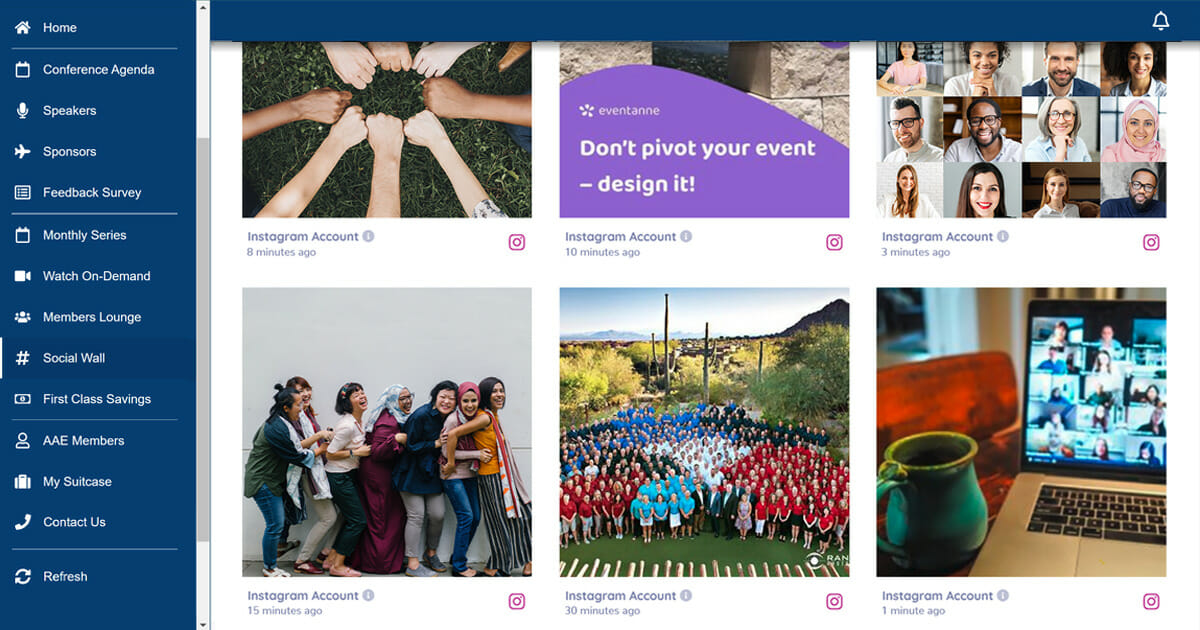
3. Increase Brand Awareness with Platform Customization
For recurring events, it’s crucial to drive up brand awareness wherever possible. TED Talks are a perfect example of an event brand that has built a robust market for on-demand video content, long after the live event is over. A strong brand will keep attendees coming back to a tight-knit community of supporters, who in turn become brand ambassadors.
On an event community platform, members can sign up for events, browse your content, and access your messaging in a centralized online space that fully matches your brand.
In contrast to social networking platforms like Facebook or LinkedIn, the best event platforms let you customize your entire online space, from the color theme to the background images. And as more and more media features are added, more and more branding opportunities arise.
In turn, this helps to build loyalty for your association, corporation, or not-for-profit organization.
How to Make it Happen
Let your community members connect in an event space that drives brand awareness by:
- Adding branded production elements to live streams and pre-recorded videos with tools like EventMobi’s self-service live stream event software
- Working with a professional live stream production team that can create custom branded motion graphics for you
- Leveraging your event platform’s event branding and design tools to create an event space that showcases your organization’s or community’s unique visual identity
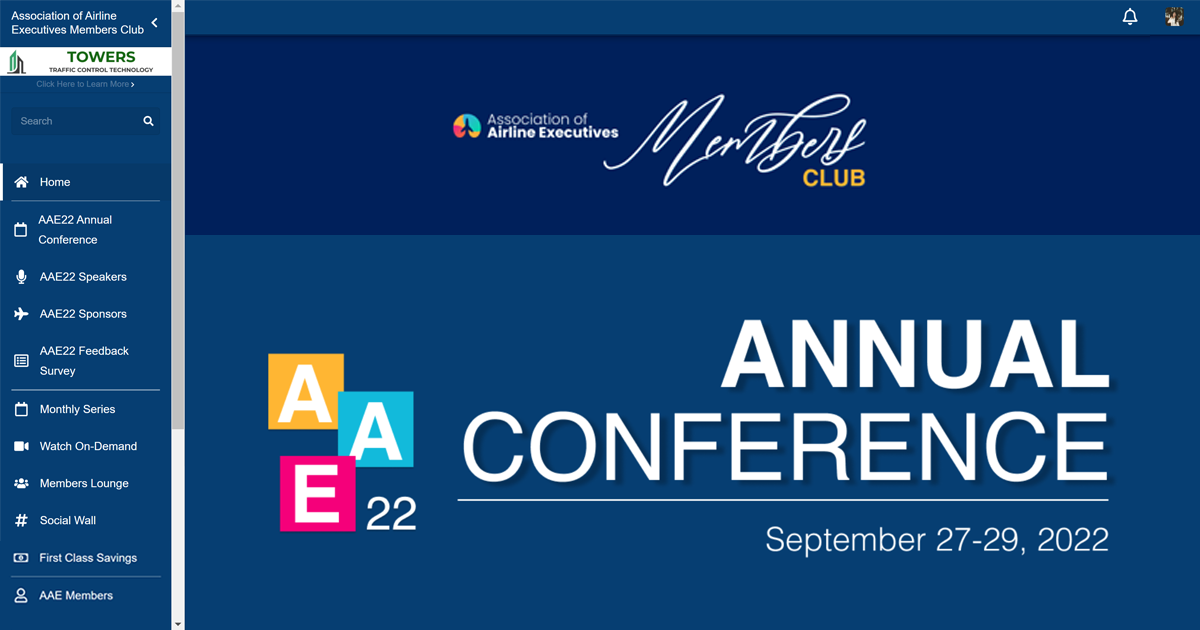
4. Grow Your Sponsorship Revenue with an Event Community Platform
Just as importantly, all of these branding opportunities can easily be redirected toward sponsor goals.
Instead of offering your sponsors a limited-time period for brand exposure, create a new year-round package. Outside of banner ads, sponsored sessions, and virtual exhibitor booths, the package can include sponsored video libraries, full-page ads, and gamification challenges. Let them browse your customized event platform, and they’ll have firsthand evidence of how effective it can be for driving brand awareness.
How to Make it Happen
Grow sponsor revenue opportunities by:
- Selling year-round access to banner ads and home page real estate
- Allowing sponsors to brand webinars and other live sessions
- Including product demos and sizzle reels in dedicated sponsor video libraries
- Hosting raffles with sponsor giveaways
- Designing monthly game challenges that encourage interaction with sponsor content
- Demonstrating event ROI with clear data on user engagement
5. Track Engagement for Better ROI Reporting and Market Segmentation
It used to be a challenge to measure and prove to senior management that attendees were engaged and making the most of the networking opportunities at your event. But with developments in event technology, it’s become much easier to measure event success and report on ROI.
As you extend access to your event platform, you allow yourself to learn more and more about your attendees. This data is not only valuable for demonstrating your event’s success to both sponsors and your marketing department—it also provides future sponsors with valuable information about attendee preferences. In other words, your event platform will help you segment your audience into target markets.
For example, attendees who watch an entire session on accounting software are likely to be interested in similar products. And this kind of information is highly valuable to prospective sponsors and event partners.
How to Make it Happen
Monitor and quantify attendee engagement by tracking:
- Participation in live chat, Q&A, live polling, discussion groups, event gamification challenges, activity feeds, etc.
- Session attendance and viewing time for live stream sessions and on-demand videos
- Virtual booths visited and appointments booked
- Social media posts (shares, hashtag usage) from the event community before, during, and after the event
- Responses to pre- and post-event polls and surveys
6. Strengthen Your Messaging & Marketing Strategy
Your event community can double as a marketing channel.
Regular updates and reminders will not only build buzz around the event itself but will also strengthen your organization’s overall marketing strategy. Leading up to the event, try producing and promoting content that helps to create excitement and build anticipation for the main attraction. For example, run webinars featuring upcoming speakers, or publish blog interviews with high-profile attendees or speakers.
How to Make it Happen
Make sure that you keep your communication channels open throughout the year with:
- Push notifications for upcoming events and important news
- Email campaigns segmented by attendee groups
- Post-event wrap-ups (roundtables, networking, etc.)
- Inspiration and insights from crowdsourced content and trending chat topics
7. Provide Easy Access to Community Resources & Research
With our increasingly digitized lifestyle, the importance of community is becoming more widespread as individuals see the value of creating, learning, and sharing together — both online and offline.
Event communities connect like-minded people, providing opportunities for moments of inspiration that encourage members to engage and commit. In the process, event community members deliver added value back to fellow attendees, event sponsors and partners, and the event organizers.
Your event platform is easily transformed into an online home for all of your community’s resources, knowledge sharing, and collaboration.
How to Make it Happen
Let your community members benefit from knowledge sharing with:
- An online portal for association resources, with easy mobile access
- A searchable hosting platform for on-demand content
- An online portal for accessing presentations and other meeting files
- An avenue for attendees to share and comment on research
- A channel for ongoing seminar presentations
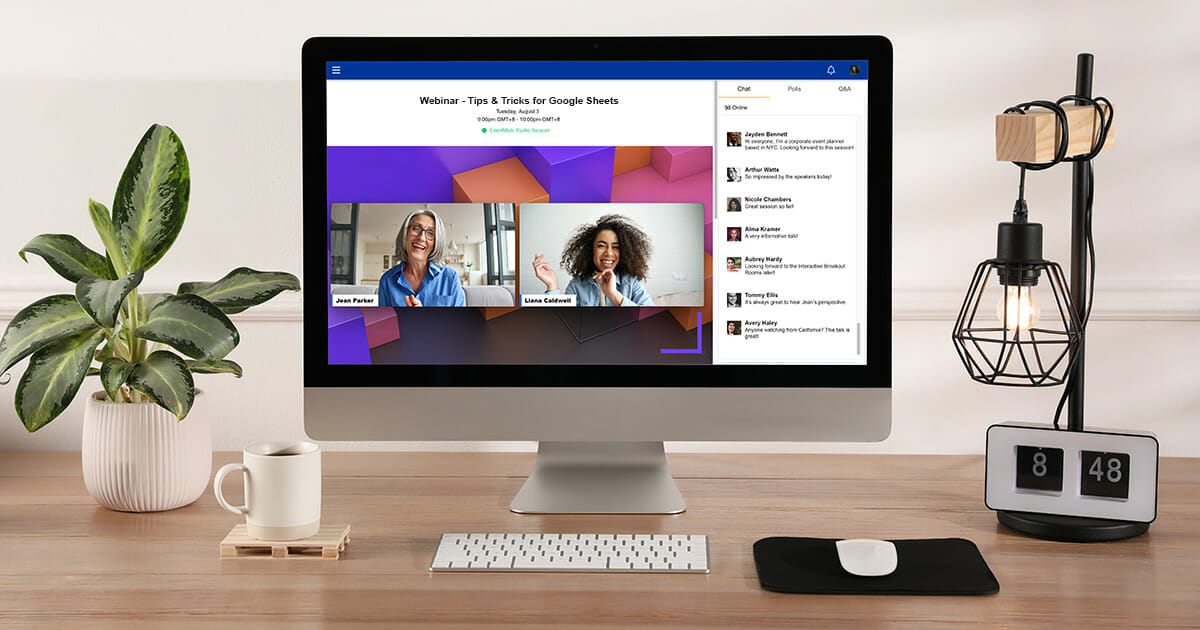
8. Offer More Opportunities for Professional Development
As we mentioned earlier in this article, your event platform can incorporate many of the benefits that come with Learning Management Software (LMS).
Your event platform can host your community’s webinars, interactive workshops, training modules, and more. With the help of analytics, you can even track how long each attendee watched a given video. This kind of hard data is invaluable when it comes time to award CE credits to your community members.
How to Make it Happen
Give your members added value with opportunities to upgrade their skills with:
- Virtual workshops and online courses
- Educational content, training videos, and webinars
- CE credits for watching webinars
How Do I Manage Membership on An Event Community Platform?
With so many benefits to creating an event community, it’s hard to turn a blind eye. But how exactly do you go from hosting periodic events to building a year-round event community?
The first step is to invest in an event platform that has all of the features needed for ongoing events, meetings, and engagement activities. Then, you have to figure out how to design your membership model. For example, you could:
- Charge a fee for an annual membership (or include event community access in existing membership fees)
- Offer non-members paid tickets to single events, with time-limited access to the community space
- Give members free or discounted access to ticketed events
- Gate access to special resources and content available to members only
For monetization purposes, it’s important to have a platform that allows you to divide attendees into groups with different levels of access to content and other community features. EventMobi’s event management software, for example, makes it easy to set conditional visibility rules for each of your attendee groups.
Why You Should Get Started Today
To say that pivoting to virtual events at the beginning of the pandemic was challenging is an understatement. With that said, the same pressures that challenged event professionals also led to rapid advances in user-friendly event technology. As a result, you now have more opportunities to engage attendees all year round. In short, event technology helps you put the ‘unity’ in ‘community’.
The real power of events comes from their ability to create shared experiences by bringing people together at the same time and in the same place. An online community doesn’t replace those events—it simply allows you to create a line of connection between them, so you can build on that first shared experience to create a true sense of community. That way, you have a loyal base of attendees waiting for you whenever your next in-person event happens.
Interested in learning more about EventMobi can help you create a thriving event community? Book your personalized demo today!
